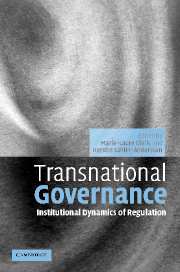Book contents
- Frontmatter
- Contents
- List of figures
- List of tables
- List of contributors
- Acknowledgments
- List of acronyms
- 1 Introduction: A world of governance: The rise of transnational regulation
- I Institutional forces
- II A dynamic transnational topography
- 7 Transnational actors, transnational institutions, transnational spaces: The role of law firms in the internationalization of competition regulation
- 8 Global enterprises in fields of governance
- 9 The transnational governance network of central bankers
- 10 Regulated regulators: Global trends of state transformation
- 11 The rationalization of universities
- III Transnational governance in the making
- References
- Index
7 - Transnational actors, transnational institutions, transnational spaces: The role of law firms in the internationalization of competition regulation
Published online by Cambridge University Press: 22 September 2009
- Frontmatter
- Contents
- List of figures
- List of tables
- List of contributors
- Acknowledgments
- List of acronyms
- 1 Introduction: A world of governance: The rise of transnational regulation
- I Institutional forces
- II A dynamic transnational topography
- 7 Transnational actors, transnational institutions, transnational spaces: The role of law firms in the internationalization of competition regulation
- 8 Global enterprises in fields of governance
- 9 The transnational governance network of central bankers
- 10 Regulated regulators: Global trends of state transformation
- 11 The rationalization of universities
- III Transnational governance in the making
- References
- Index
Summary
Introduction
The emergence of systems of transnational regulation and governance in the last decade has been a considerable challenge to authors studying patterns of business and management from an institutionalist perspective. One view, expounded most clearly in Whitley, is that “as long as the nation state remains the primary unit of political competition, legitimacy and definer and upholder of private property rights, in addition to being the predominant influence on labor market institutions, many characteristics of business systems will continue to vary significantly across national boundaries” (Whitley 2005a: 224). Inevitably such arguments are countered by contrary claims showing how, in specific areas, forms of transnational governance are emerging, what Djelic and Quack refer to as “the progressive transnationalization of a few actors, strategies and logics” (Djelic and Quack 2003: 11).
In this chapter, I examine this issue through distinguishing three elements – transnational social spaces, transnational actors and transnational institutions. As transnational phenomena, each of these elements emerges out of the dynamics of globalization and the weakening of nation-states as frameworks for economic coordination. However, each of them emerges out of different processes and this affects how their interdependence evolves. By distinguishing these elements, it becomes possible to understand the broader phenomenon of the emergence of a transnational sphere as complex and contingent.
I explore these ideas through examining transnationalization in relation to competition law. As Djelic and Kleiner (ch. 14) show, the emergence of transnational governance of competition law is very recent.
- Type
- Chapter
- Information
- Transnational GovernanceInstitutional Dynamics of Regulation, pp. 139 - 160Publisher: Cambridge University PressPrint publication year: 2006
- 19
- Cited by



